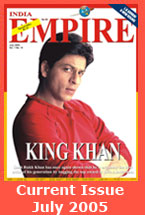| |
The storm that was raging in the Sangh over BJP President L.K. Advani issuing a character certificate to Pakistan founder Mohammad Ali Jinnah has died down. However, the detritus of the debate, which dominated the front pages of Indian newspapers, is unlikely to vanish in a hurry. It's easy to see why Advani touched upon a raw national nerve. As the person responsible for the deaths of so many Hindus during the partition of the country, Jinnah has long been reviled by most Indians.
The controversy began when Advani, a former deputy prime minister, became the first senior Indian leader to visit Jinnah's mausoleum. Advani's message was that it was time to forget the past and look forward. He even suggested subsequently that India and Pakistan could some day form a European-style confederation.
Advani has said much of this before, but the Karachi setting amplified the remarks. His party, which has long espoused the view that India should never have been divided, was openly at odds with him. Leaders of Hindu activist groups, including the Vishwa Hindu Parishad, denounced Advani as a “traitor”.
As the demands for his resignation mounted, an exasperated Advani said he was calling it quits as party president. Advani's decision came after the leadership of the Rashtriya Swayamsevak Sangh, the BJP's nationalist parent organisation, asked him to reconsider his statement. However, former prime minister Atal Bihari Vajpayee, supported Advani and said his remarks had been misinterpreted.
Advani has been accused of not only visiting the mausoleum, he is also accused of having certified Jinnah as “secular”. But, in fact, Advani said nothing of the kind. All he mentioned about Jinnah was an entry in the visitors' book at the mausoleum on June 4: “His address to the Constituent Assembly of Pakistan on August 11, 1947 is a classic, a forceful espousal of a secular state in which every citizen would be free to practise his own religion but the state shall make no distinction between one citizen and another on the grounds of faith.” |
|




